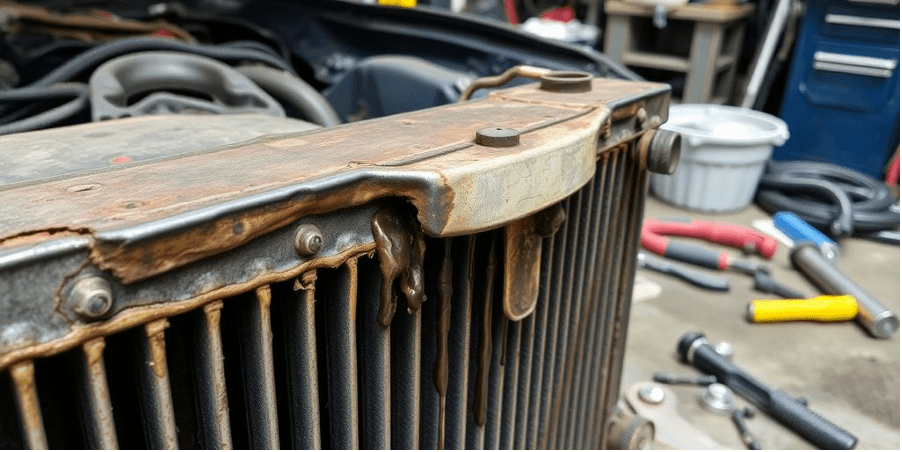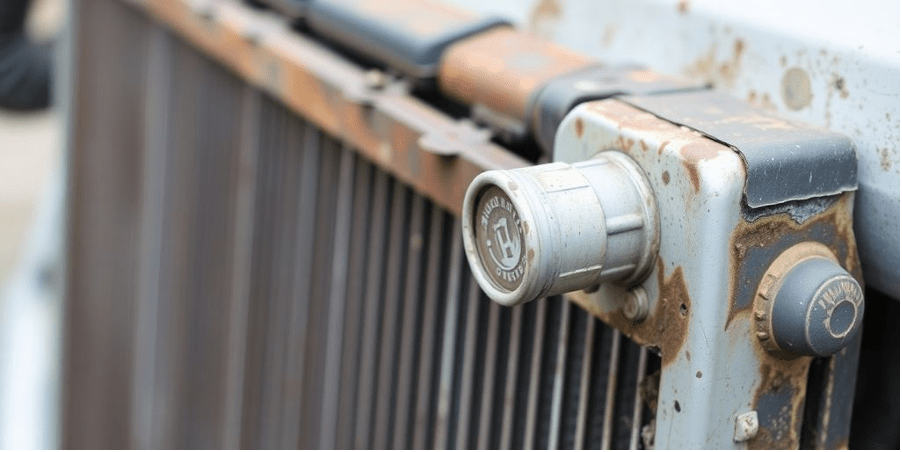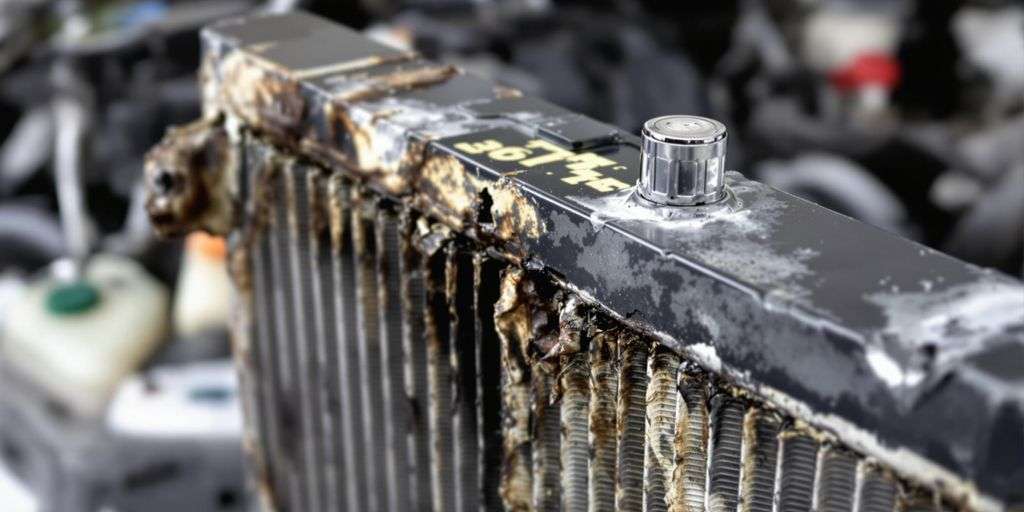Key Takeaways
- Understand the impact of a damaged radiator on your car's value.
- Be upfront about the car's condition to avoid legal issues.
- Research market value and factor in repair costs when pricing your car.
- Target the right buyers, like mechanics or salvage yards.
- Prepare all necessary documents for a hassle-free sale.
Understanding the Challenges of Selling a Car with a Damaged Radiator
Impact on Car Value
Selling a car with a damaged radiator can significantly affect its market value. Radiators are crucial for engine performance, and any damage can lead to overheating, which might result in costly repairs. Potential buyers might see this as a red flag, and it's likely they'll offer less than the car's worth in top condition. If you're thinking of selling, consider the cost of repairs against the potential sale price. A quick fix might boost your car's value and attract more interest.
Legal Disclosure Requirements
When selling a car with known issues like a damaged radiator, being upfront about the problem is not just good practice—it's often a legal requirement. You must disclose all known defects to avoid future disputes. Transparency builds trust and can prevent legal issues down the line. If defects arise after the sale, it might be wise to seek mediation through a dispute resolution organization before considering legal action.
Potential Buyer Concerns
Buyers will have their concerns, especially if they're not mechanically inclined. They'll worry about the extent of the damage and the cost of repairs. To ease these concerns, provide detailed information about the car's condition and any quotes for repair costs you've obtained. A simple list of the car's issues, along with any maintenance records, can go a long way in reassuring potential buyers. Consider targeting buyers who are mechanics or car enthusiasts, as they might be more willing to take on a project car.
Preparing Your Car for Sale: Essential Steps
Removing Personal Belongings
Over time, cars become storage spaces for all sorts of personal items—think forgotten gym clothes, old CDs, or even important documents. Before you sell your car, take the time to thoroughly search every nook and cranny. Check under seats, in the trunk, and in all those little compartments. You'd be surprised what you might find!
Draining Fluids and Hazardous Materials
Most buyers expect the car to be free of hazardous materials like gasoline, oil, and coolant. Here’s a quick rundown on how to handle this:
- Gasoline: Use a siphon pump to remove gasoline from the tank into a certified container.
- Oil: Remove the drain plug and let the oil flow into a suitable container.
- Coolant: Open the radiator cap (when the engine is cool) to drain coolant into a container.
Dispose of these fluids according to local regulations—some auto parts stores or recycling centers will take them off your hands.
Documenting the Car's Condition
Honesty is your best policy when it comes to selling a car with a damaged radiator. Document any visible damage, such as dents or scratches, and be upfront about mechanical problems. Take clear photos from multiple angles and keep a record of any repairs or maintenance work you’ve done. This transparency can help build trust with potential buyers and prevent disputes later on.
Selling a car, even one with a few issues, doesn’t have to be an ordeal. With some prep work, you can make the process smoother and more straightforward. Just remember, a bit of honesty goes a long way in building trust and ensuring a fair transaction.
Navigating Legal and Documentation Requirements

Understanding Salvage Titles
When your car's radiator is damaged beyond repair, it might end up with a salvage title. A salvage title indicates that the car has suffered damage that makes repair costs exceed its market value. This can significantly affect the car's resale value and appeal to buyers. It's crucial to be upfront about this status with potential buyers to avoid any legal issues down the line.
State-Specific Laws and Regulations
Each state has its own set of rules when it comes to selling a car with significant damage. It's important to:
- Research State Laws: Check your state's DMV website for specific regulations about selling a car with a damaged radiator.
- Emission Standards Compliance: Some states might require an emissions test even if the car isn't in running condition.
- Documentation Needs: Make sure you have all necessary paperwork, like the title, bill of sale, and any disclosures regarding the car's condition.
Completing the Title Transfer
Transferring the title is a key step in selling your car. Here's what you need to do:
- Prepare a Bill of Sale: Include all necessary details such as buyer and seller information, vehicle identification number (VIN), sale price, and date of sale. Both parties should sign this document.
- Sign Over the Title: Make sure you sign in the correct section to transfer ownership. If there's a lien on the title, it must be cleared before proceeding.
- Notify the DMV: Report the sale to your local Department of Motor Vehicles to officially transfer the title and remove liability from your name.
Selling a car with a damaged radiator involves more than just finding a buyer. It requires careful attention to legal details to ensure a smooth transaction and avoid future disputes.
Setting a Fair Price for Your Car

Researching Market Value
When you're selling a car with a damaged radiator, the first step is to figure out what it's worth. Start by checking online resources like Kelley Blue Book or Edmunds. These sites can give you a ballpark figure based on your car's make, model, and year. But remember, your car's damage will likely lower its value. To get a clearer picture, get quotes from several junk car buyers or salvage yards. This way, you can see what others are willing to pay and avoid getting lowballed.
Considering Repair Costs
Next up, think about repair costs. If you decide to fix the radiator before selling, you'll want to weigh the repair cost against the potential sale price. Sometimes, fixing the car might not be worth it if the repair costs are too high. It's a balancing act—spend too much on repairs, and you might not make it back in the sale.
Negotiating with Buyers
Once you've got an idea of your car's worth, it's time to negotiate. Be ready to explain the damage and how it affects the car. Some buyers might try to use the radiator issue to knock down the price. Stay firm but open to reasonable offers. Here's a tip: if you've gathered multiple offers, use them to your advantage. Let potential buyers know that others are interested. It might just help you snag a better deal.
Setting a fair price isn't just about numbers; it's about understanding your car's value and being prepared to back it up in negotiations. Keep your expectations realistic, and you'll be more likely to find a buyer who sees the value in your vehicle.
Finding the Right Buyer for Your Car
Targeting Mechanics and Hobbyists
When selling a car with a damaged radiator, mechanics and hobbyists can be your best friends. They often look for cars to fix up or use for parts. Mechanics might see your car as a chance to teach new skills or as a project to work on during downtime. Hobbyists, on the other hand, love a challenge and often have the tools and know-how to tackle tricky repairs.
- Mechanics: They might be interested in your vehicle for training purposes or as a side project.
- Hobbyists: These individuals enjoy the challenge of fixing cars and often have the tools needed for repairs.
- Car clubs: Engaging with local car clubs could also lead you to potential buyers who are passionate about car restoration.
Utilizing Online Marketplaces
Online platforms like eBay, Craigslist, and Facebook Marketplace are great places to find potential buyers. You can reach people who are specifically searching for cars in need of repair. Create a detailed listing with clear pictures and an honest description of the car's condition.
- eBay: Offers a wide audience and the ability to auction your car.
- Craigslist: Great for local sales and easy communication.
- Facebook Marketplace: Allows you to connect with local buyers quickly.
Approaching Salvage Yards
Sometimes, selling to a salvage yard is the simplest option. Salvage yards are interested in cars for their parts and scrap metal value. It's a straightforward way to get rid of your car without the hassle of finding a private buyer.
- Quick sale: Salvage yards offer a fast and easy transaction.
- Parts value: They are primarily interested in the usable parts of your vehicle.
- Scrap metal: Even if your car isn't fixable, the metal still has value.
Selling a car with a damaged radiator might seem daunting, but by targeting the right buyers, you can turn a challenge into an opportunity. Whether you connect with a mechanic, list it online, or head to a salvage yard, there's always a way to find a buyer. Consider the best option for your situation and go for it.
Maximizing Your Profit: Tips and Strategies
Getting Multiple Quotes
When selling a car with a damaged radiator, it's smart to shop around. Getting multiple quotes from different buyers can help you understand the market and make sure you're not underselling your vehicle. Consider reaching out to mechanics, salvage yards, and online marketplaces. Each might offer different values based on their interest or need for your car's parts.
Highlighting Valuable Parts
Even if your car isn’t running perfectly, it might still have parts that are in demand. Identify and highlight these parts when talking to potential buyers. Engines, transmissions, and electronics are often sought after, even if the radiator is shot. You might even list these parts separately if you're willing to dismantle the car yourself.
Negotiating Effectively
Negotiation can be a bit of a dance, but it’s important to know your bottom line. Be prepared to haggle, but also know the minimum price you're willing to accept. It helps to be informed about the car's condition and market value. This way, you can confidently stand your ground or know when to walk away.
By understanding the intrinsic value of your car, you can better position yourself in negotiations, ensuring a deal that's both fair and rewarding.
In the world of used car sales, knowing your inventory and what each part is worth can make all the difference. Regularly assessing your vehicle's condition and the current market can boost your confidence and profit margin.
Finalizing the Sale and Post-Sale Considerations
Preparing the Car for Pickup
Once you’ve sealed the deal, it’s time to get your car ready for the new owner to pick up. Start by clearing any obstacles around the car. If it’s parked in a garage or tight spot, make sure there’s enough space for towing equipment to get in and out. Don't forget to remove the license plates—in some states, you'll need to return them to the DMV.
Canceling Registration and Insurance
After the car is out of your hands, you need to handle some final paperwork. Contact your local DMV to cancel your car's registration to avoid any future fees or fines. Also, reach out to your insurance provider to cancel the policy. If you’re switching to a new car, you might be able to transfer the insurance instead.
Ensuring a Smooth Transaction
To make sure everything goes off without a hitch, have all your documents ready. This includes the title, bill of sale, and any other paperwork the buyer might need. It’s a good idea to keep a copy of everything for your records. A little preparation can prevent headaches down the line.
Selling a car with a damaged radiator can be tricky, but with the right steps, you can make the process hassle-free. By being organized and clear about your car's condition, you're more likely to find a buyer who appreciates the deal they're getting.
Wrapping It Up: Selling Your Car with a Damaged Radiator
So, there you have it. Selling a car with a busted radiator isn't the end of the world, but it does take some planning. First off, make sure you're upfront about the radiator issue with potential buyers. Honesty really is the best policy here. You'll want to check out your state's specific rules about selling a car in this condition, too. Some places have stricter regulations than others. Don't forget to gather all the necessary paperwork, like the title and bill of sale, to keep things legit. And hey, if you're not up for fixing the radiator yourself, selling the car as-is might be the way to go. Just be sure to price it fairly, considering the repair costs. With a bit of preparation and the right approach, you can turn this situation into a smooth transaction. Good luck out there!
Frequently Asked Questions
Can I sell a car with a damaged radiator?
Yes, you can sell a car with a damaged radiator, but you should be honest about the issue with potential buyers.
How does a damaged radiator affect my car's value?
A damaged radiator can lower your car's value because it might require repairs, which can be costly.
Do I need to tell buyers about the damaged radiator?
Yes, it's important to disclose any known issues, like a damaged radiator, to buyers to avoid future problems.
What should I do before selling my car with a damaged radiator?
Remove all personal items, document the car's condition, and make sure you have all the necessary paperwork ready.
How do I set a fair price for my car with a damaged radiator?
Research similar cars, consider repair costs, and be ready to negotiate with buyers.
Who might be interested in buying a car with a damaged radiator?
Mechanics, hobbyists, and salvage yards might be interested in buying a car with a damaged radiator.



